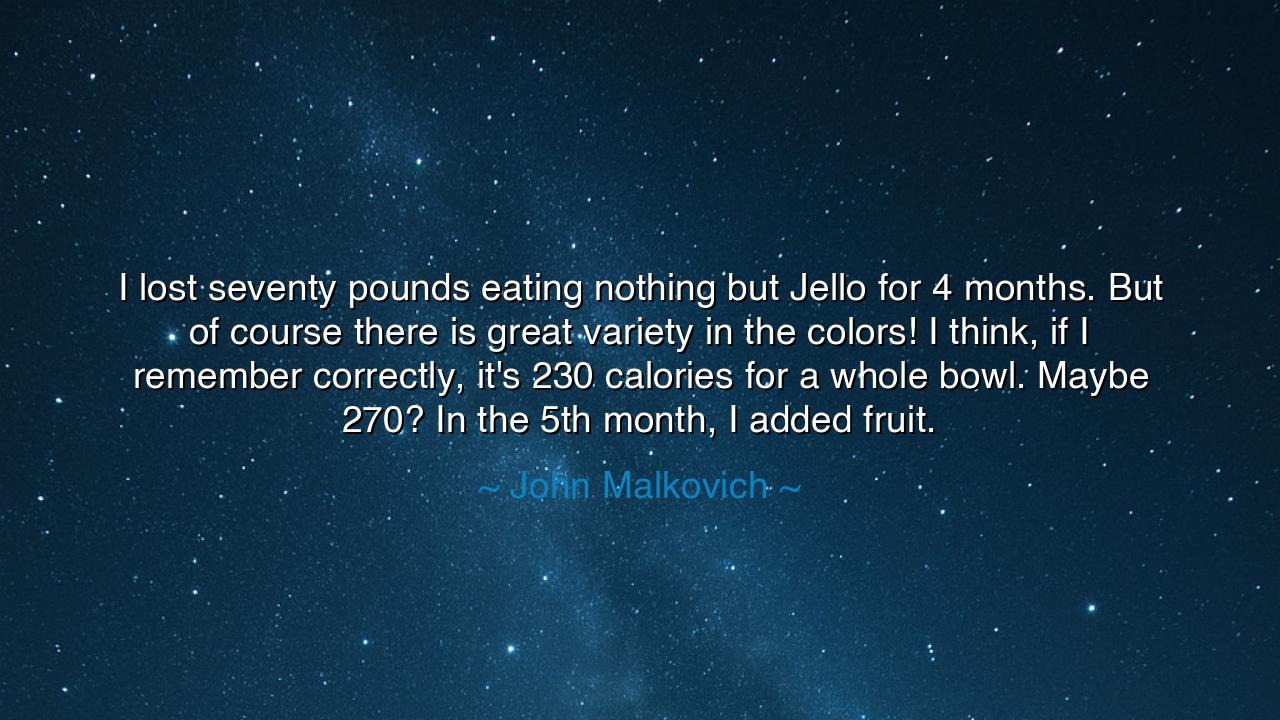
I lost seventy pounds eating nothing but Jello for 4 months. But
I lost seventy pounds eating nothing but Jello for 4 months. But of course there is great variety in the colors! I think, if I remember correctly, it's 230 calories for a whole bowl. Maybe 270? In the 5th month, I added fruit.






When John Malkovich said, “I lost seventy pounds eating nothing but Jello for four months. But of course there is great variety in the colors! I think, if I remember correctly, it’s 230 calories for a whole bowl. Maybe 270? In the fifth month, I added fruit,” his words, though spoken with irony and humor, carry beneath their surface a parable about discipline, obsession, and the strange ways in which the human will seeks control over its own desires. In this curious tale of restraint, there is not merely a story of dieting, but a reflection on the extremes to which one may go to reclaim mastery over the self — and how the pursuit of mastery, when divorced from balance, can become both noble and absurd.
The origin of this quote lies in Malkovich’s own life, a period when he sought to transform his body through an extreme act of self-denial. Known for his eccentric brilliance, Malkovich often walks the thin line between reason and madness — a territory where creativity and control wrestle endlessly. His story of eating nothing but Jello — a food of color and emptiness, of sweetness without substance — becomes almost allegorical. It is the image of a man who, weary of the weight of indulgence, chooses instead the ascetic simplicity of repetition. Yet within his tone lies a touch of self-mockery, as if he, too, understands the futility of trying to perfect the impermanent vessel of flesh through sheer will.
The ancients would have recognized this tale, though clothed in modern absurdity, as a form of stoic trial. For what is the fasting of the monk, or the isolation of the hermit, if not a renunciation of the body’s whims in pursuit of clarity? In the desert, saints lived on locusts and honey; in the mountains, philosophers lived on bread and olives. Malkovich, in his age of neon and convenience, chose gelatin. Yet his sacrifice mirrors theirs: a hunger to prove that the mind can rule the body, that discipline, even when misdirected, possesses its own kind of power. There is both heroism and folly in such acts, for they remind us that human beings are creatures of paradox — capable of immense control, yet endlessly tempted by excess.
Consider the story of Diogenes of Sinope, who lived in a barrel and mocked the vanity of men. He owned almost nothing, eating simple food from his hands, scorning the indulgence of others. Once, seeing a child drink water from his cupped palms, Diogenes cast away his bowl, exclaiming, “A child has bested me in simplicity!” Like Malkovich, he sought liberation through austerity, though his purpose was philosophical rather than physical. Both men, separated by centuries, embody a truth the wise have long known: that the path to freedom sometimes passes through deprivation — but that deprivation itself can become a cage if it lacks wisdom.
Malkovich’s humor — his lightness in describing such extremity — adds another layer to the teaching. When he jokes about the “variety in the colors” of his Jello, he exposes the fragile illusion of comfort we construct even in hardship. It is the human tendency to find beauty in limitation, to turn monotony into art, suffering into story. It recalls the painter who, confined to one color, learns to capture infinite shades within it; or the prisoner who, with no canvas but his mind, imagines entire worlds. In this way, even absurdity becomes endurance, and endurance, when accepted with grace, becomes wisdom.
Yet his words also warn us of the danger of imbalance — the peril of mistaking control for harmony. To eat only Jello is to live without nourishment; to live only by rule is to starve the soul. True discipline does not destroy, but sustains; it is the middle path between indulgence and denial. As the philosopher Aristotle taught, virtue lies in moderation — not in the excess of austerity, nor in the surrender to appetite, but in the quiet art of balance. Malkovich’s tale, when stripped of its irony, reminds us that obsession, however noble its origin, becomes destructive when it forgets the joy it was meant to serve.
So, my listener, take this story as a mirror for your own life. Whether your pursuit is of health, art, or wisdom, let your discipline be guided by love, not by punishment. Learn to master your habits without becoming their prisoner. Remember that control without compassion hardens the heart, and that even the most rigid path should allow room for laughter — as Malkovich’s story so playfully does.
For in the end, this is what his words teach us: that self-mastery is a sacred art, but it must never lose its humanity. To deny oneself is sometimes necessary, but to forget the beauty of living is the gravest loss of all. So eat the Jello if you must — but when the time is right, as Malkovich himself did, remember to add the fruit. For the fruit is life itself — color, sweetness, and renewal — the symbol that after every season of restraint, joy must once again find its way to the table of the soul.






AAdministratorAdministrator
Welcome, honored guests. Please leave a comment, we will respond soon